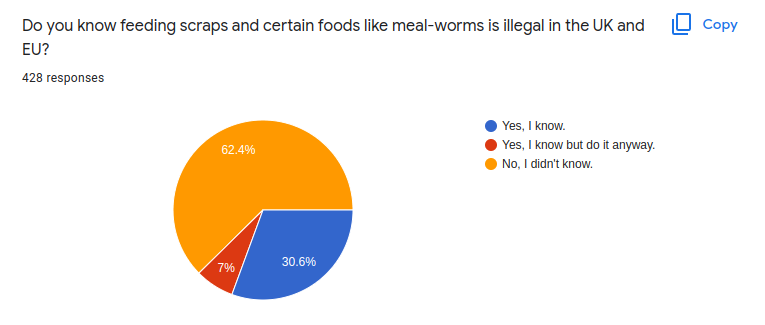British Chicken Keepers May Be Breaking the Law Without Even Realising It, Reveals Survey by Cluckin.net.
- Survey reveals how many people were unaware of certain laws relating to keeping and feeding chickens; as well as how many were aware but ignored these laws.
- It is a common misconception among backyard keepers that poultry are considered pets, instead of livestock.
- Cluckin.net delves into the guidelines, orders and laws that govern the keeping of poultry in the UK.
Laws Governing Poultry Keeping in the UK
Legislation surrounding the feeding and keeping of poultry has changed over the years, getting more and more stringent for keepers. It is a common misconception among backyard keepers that their poultry – including ducks, chickens, turkeys, geese, guinea fowl, pheasants, and partridges – are considered pets, instead of livestock.
The issue is that there many backyard keepers misconceive those laws and regulations do not apply to them, as they may only have a few chickens they consider ‘pets. However, in the UK, all chickens and poultry are considered livestock and subject to the law – even if you only have two or three of these animals as pets in your garden.
Survey Results:
CluckIn.net surveyed people in the UK on their knowledge of regulations relating to keeping poultry and the results revealed that 62.4% were unaware of a change in the law, which stipulates that it is illegal to feed scraps and certain foods (like mealworms) to poultry. Only 30.6% of respondents said they were aware of the law and an apathetic 7% said they knew about it, however, they ignored it.
There are nine Acts of Parliament, regulations, or orders that directly govern the keeping of poultry in the UK. These guidelines and laws control how animals in this category are kept, fed, and looked after.
The specific laws and Acts of Parliament governing poultry keeping consist of the following:
- Animal Welfare Act 2006
- The Welfare of Farmed Animals Regulations 2007
- The Welfare of Animals Order 2006
- Animal Health Act 1981
- Prevention of Damage by Pests Act 1949
- The Animal By-Products Regulations 2013
- Wildlife and Countryside Act 1981
- Allotments Act (1950)
- Guidance on fallen stock and safe disposal of dead animals.
List of Minimum Requirements for Keeping Chickens
Under the Welfare of Farmed Animals Regulations 2007, there is a set of standards which must be met when it comes to keeping all farm animals, including poultry and chickens kept for domestic purposes.
According to the law, chickens must be provided with the following standards:
- Linear feeders that provide at least 10 cm per bird, or circular feeders that provide at least 4 cm per bird.
- Continuous drinking troughs, which provide 2.5 cm per hen, or circular drinking troughs, providing 1 cm per hen.
- At least 1 nest for each 7 hens kept.
- Adequate perches, without sharp edges, providing at least 15 cm per hen. Perches must be 30 cm apart and 20 cm away from walls and not positioned over litter.
- A minimum headroom of 45 cm.
- Pop holes must be at least 35 cm high and 40 cm wide.
- Feed and water must be distributed evenly, ensuring all birds have access to these resources.
- A litter area, allowing space for scratching and pecking.
- All hens must be inspected by the owner, or the person responsible for the hens, at least once per day.
- Light levels must be sufficient, allowing all hens to see one another and be seen clearly. This allows them to investigate their surroundings visually and display normal levels of activity.
- Confined chickens must have at least 750 cm² of cage area per hen.
- Hens must be housed in an adequate structure.
- Poultry must be protected from predators.
- Fencing of housing and livestock is the responsibility of the stock owner.
- Chickens must be handled in the correct manner.
Legal Requirements for Selling Eggs
The UK has stringent laws regarding the sale of eggs. Regulations state that if you have fewer than fifty hens, you can sell eggs from the end of your driveway. If you do sell your eggs, it is a legal requirement to maintain an up-to-date record of all medicines administered to food producing animals, whether prescribed by a veterinary surgeon, or ready mixed into feed. These records must be retained for at least 5 years.
There is a set of strict requirements you must comply with:
- You are not allowed to class eggs in any way, or wash them
- You may not label them as small, medium, or large, or call them ‘organic’ or ‘free range’.
- Eggs cannot be sold to shops, restaurants, or for resale purposes.
- You must date the eggs.
- You may not sell cracked eggs.
- Use plain egg boxes and remove any existing labels.
- The box must contain your name and address, as well as storage information and use by dates.
